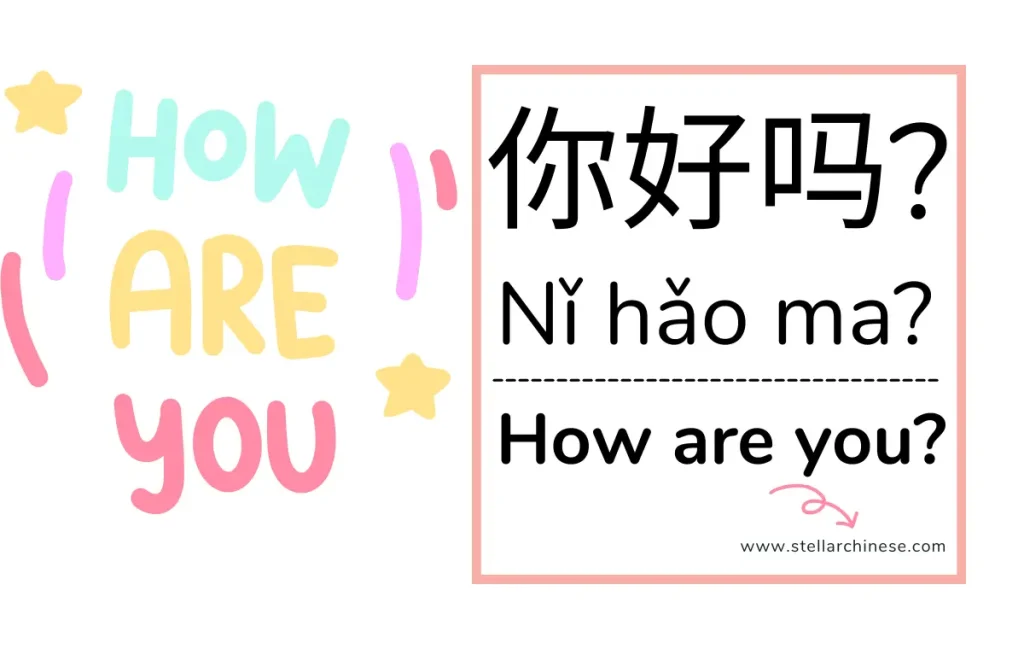If you’re learning Chinese, you’ve probably come across the phrase how are you? and wondered how to use it naturally. But here’s the thing — native speakers don’t really use it the way English speakers do!
In this guide, I’ll show you what people actually say, how to greet someone in a natural way, and how to respond like a pro.
How Are You in Chinese
You might have learnt 你好吗? (Nǐ hǎo ma?), but let me tell you a secret — it’s not something Chinese people use often in daily conversations. It’s a textbook phrase, but not really how locals greet each other. Instead, we have more natural ways to check in on someone.
Further reading:
- Different Ways to Say You’re Welcome in Chinese
- Saying Goodbye in Chinese
- The Best Ways to Say Thank You in Chinese
- Romantic and Friendly Ways to Say I Love You in Chinese
- Is Saying Sorry Enough in China? What Locals Expect
- The Best Times to Use Hello vs. Morning
- Wait… How Do You Actually Say Good Night in Chinese?
你怎么样? (Nǐ zěnme yàng?)
How are you?
This is a more natural way to ask how someone is doing and is commonly used between friends in casual conversations.
一切顺利吗? (Yīqiè shùnlì ma?)
Is everything going smoothly?
This phrase is often used to check in on someone after a big event or change.
最近忙些什么? (Zuìjìn máng xiē shénme?)
What have you been busy with lately?
Asking what you have been busy with lately is a common way to show interest in someone’s life.
身体好吗? (Shēntǐ hǎo ma?)
How is your health?
This is often used when speaking with elders or checking in on someone who is recovering from an illness.
大家好! (Dàjiā hǎo!)
Hello everyone.
This is a common way to greet a group of people and means hello everyone.
最近去哪儿呢?(Zuì jìn qù nǎr ne?)
Where have you been lately?
This question is a casual way to inquire about their recent activities.
什么事? (Shénme shì?)
What’s up?
This phrase is a casual way to ask what is up or what is going on.
你最近过得好吗? (Nǐ zuìjìn guòde hǎo ma?)
Have you been doing well recently?
This question is great for checking in on someone you haven’t seen in a while. While this might seem a bit nosy in English, in Chinese culture, it is a natural and friendly way to show interest in someone’s life.
你不舒服吗? (Nǐ bù shūfu ma?)
Are you feeling unwell?
This question can be used when they look tired or under the weather.
还好吗? (Hái hǎo ma?)
Are you still doing okay?
This question is a simple, natural way to check on them.
怎么了? (Zěnme le?)
What happened?
This question is useful when someone looks upset or concerned.
你吃过饭了吗? (Nǐ chīguò fànle ma?) / 你吃了吗 (Nǐ chīle ma)
Have you eaten?
This phrase literally means have you eaten, but it is often just a friendly way to start a conversation. In Chinese culture, asking about meals is a way to express care rather than an actual inquiry about food.
How to Respond to How Are You in Chinese
还凑合 (Hái còuhé) Not too bad.
A casual way to say things are just okay.
我还好 (Wǒ hái hǎo) I’m okay.
A neutral and safe response.
还行 (Hái xíng) Pretty good.
A casual way to say things are just okay.
不错 (Bù cuò) I’m not bad.
A slightly more positive way to reply.
我最近忙 (Wǒ zuìjìn máng) I’ve been busy lately.
A natural response that can lead into talking about what’s been going on.
混日子吧 (Hùn rìzi ba) Just getting by.
A casual, slightly humorous way to say you’re managing.
别提了 (Biétíle) Don’t even mention it.
Used when you’ve been having a rough time and don’t want to get into details.
FAQs on How Are You in Chinese
What Is the Chinese Traditional Way of Greeting?
Traditional Chinese greetings often reflect care and concern rather than just saying hello.
A common phrase is 你吃过饭了吗 (Nǐ chīguò fànle ma), which literally means Have you eaten? but is more about showing concern for the person’s well-being.
Other traditional greetings include 最近忙些什么 (Zuìjìn máng xiē shénme), meaning What have you been busy with lately?, and 身体好吗 (Shēntǐ hǎo ma), which asks about someone’s health, often used when greeting elders.
How Do You Respectfully Address a Chinese Person?
Respect in Chinese culture is very important, and how you address someone depends on the situation.
Instead of using just a first name, it is more polite to use a title along with the surname, such as 王先生 (Wáng xiānshēng) for Mr. Wang, 李老师 (Lǐ lǎoshī) for Teacher Li, or 王经理 (Wáng jīnglǐ) for Manager Wang.
Similarly, 女士 (nǚshì) is a respectful way to address a woman, such as 张女士 (Zhāng nǚshì) for Ms. Zhang. If speaking to someone older or in a formal situation, using 您 (nín) instead of 你 (nǐ) also adds a layer of politeness.
Final Thoughts
Chinese greetings are all about connection and warmth.
Instead of just memorizing textbook phrases, try using what real people say!
Next time you greet someone in Mandarin, switch things up and go for a natural, friendly approach.
Want to keep learning Chinese the fun and easy way? Stick with me at Stellar Chinese, where I’ll help you sound like a native and enjoy the learning process.
If this made you smile, taught you something new, or even made you rethink how to greet someone in Mandarin, share it with a friend! Learning a language is like a great conversation — it’s always better when shared.
